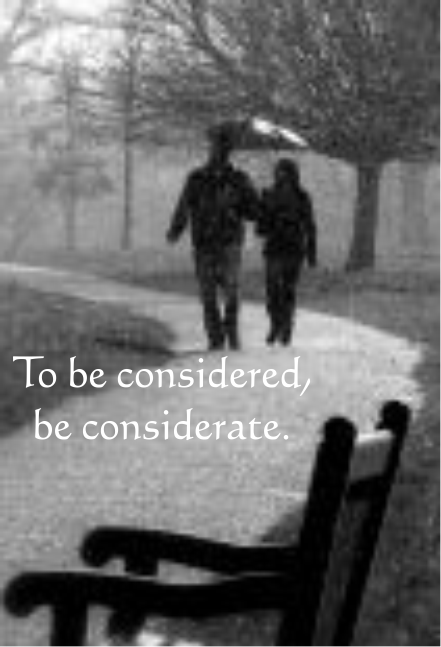










Popular Articles
Crazy-Makers: Dealing with Passive-Aggressive People
Why Are People Mean? Don't Take It Personally!
Struggling to Forgive: An Inability to Grieve
The Secret of Happiness: Let It Find You (But Make the Effort)
20 Steps to Better Self-Esteem
7 Rules and 8 Methods for Responding to Passive-aggressive People
What to Do When Your Jealousy Threatens to Destroy Your Marriage
Guide to How to Set Achieveable Goals
Catastrophe? Or Inconvenience?
Popular Audios
Audio Version of Article: Crazy-Makers: Passive-Aggressive People
Audio Version of Article: Why Are People Mean? Don't Take It Personally!
Index
Previous Next
50 RULES OF LIFE
Rule 2: To Be Considered, Be Considerate
I have seen this same reaction from others in my own personal experience. For instance, when I worked in hospitals I took the time to talk to the office staff, ask about their families, and generally take an interest in them. What I noticed (although it was not my purpose for taking time with them) was they responded to my requests much more quickly than requests from other doctors who just treated them like office help and not as people.
 There are several aspects to this rule that are important:
There are several aspects to this rule that are important:1) The responsibility is yours, not others. Too often I have seen people demand that they be respected or that others should treat them better. Frequently I hear couples say “If only she...” or “If he would...” indicating that they would behave better if the other person did first. Many people place the responsibility for change on someone else instead of taking responsibility themselves.
However, we don't have control over other people's behavior. We only have control over our own actions. Therefore, if we want to change how others respond to us, we need to change how we act towards them. By being aware of and managing your own behavior, you have greater control over how others react towards you.
Generally, people respond automatically to others without thinking through why or how they are responding. What research does tell us is that our emotional responses to others will tend to direct our behavior (Reich, Zautra, and Davis, 2003). I experienced this recently when I realized I made a deliberate detour to a farther away check-out line at a retail store because I knew from previous experience that the nearer clerk was a very negative person. I knew that no matter how positively I responded to her she could turn the interaction in a negative direction and I chose to not participate in such an unpleasant contact.
2) Being considerate of others doesn't take effort. Although there may need to be a conscious effort initially if you are changing a behavioral pattern, generally being considerate does not require any more effort than being demanding, disrespectful, or inconsiderate. However, being considerate is self-reinforcing. As you treat others considerately, you receive much more positive responses from others. In this way your behavior is reinforced and over time is likely to become more automatic.
I noticed this years ago when I was studying some research about couples' interaction and decided that I was being too critical of my husband. I made a concerted effort to increase my positive reactions towards him so that the positive would balance out the negative at a 5 to 1 ratio. In other words, for every criticism I needed to engage in five positive interactions. Although it was difficult at first, it became so rewarding for me because of the response I received in return that it has become my automatic way of treating my husband.
3) Being considerate isn't the same as being passive. If you have read any material on being assertive you will recognize that you can assert yourself and still be considerate. In fact, that is what distinguishes assertion from aggression. Assertion considers the other person and is a communication style that is direct without violating others
I would go even further, however, and state that being assertive is more considerate than being passive. Assertive communication allows others to know your intentions, your needs, and your preferences more clearly. As such, it allows them to take you into consideration when making decisions or when responding to you. I think this is much more considerate than leaving people guessing.
Reich, J.W., Zautra, A.J. and Davis, M. (2003). Dimensions of Affect Relationships: Models and Their Integrative Implications. Review of General Psychology, 7, 66–83. DOI: 10.1037/1089-2680.7.1.66
Copyright © 2014
by Excel At Life, LLC.
Permission to reprint this article for non-commercial use is granted if it includes this entire copyright and an active link.
Permission to reprint this article for non-commercial use is granted if it includes this entire copyright and an active link.













